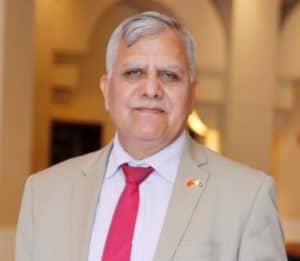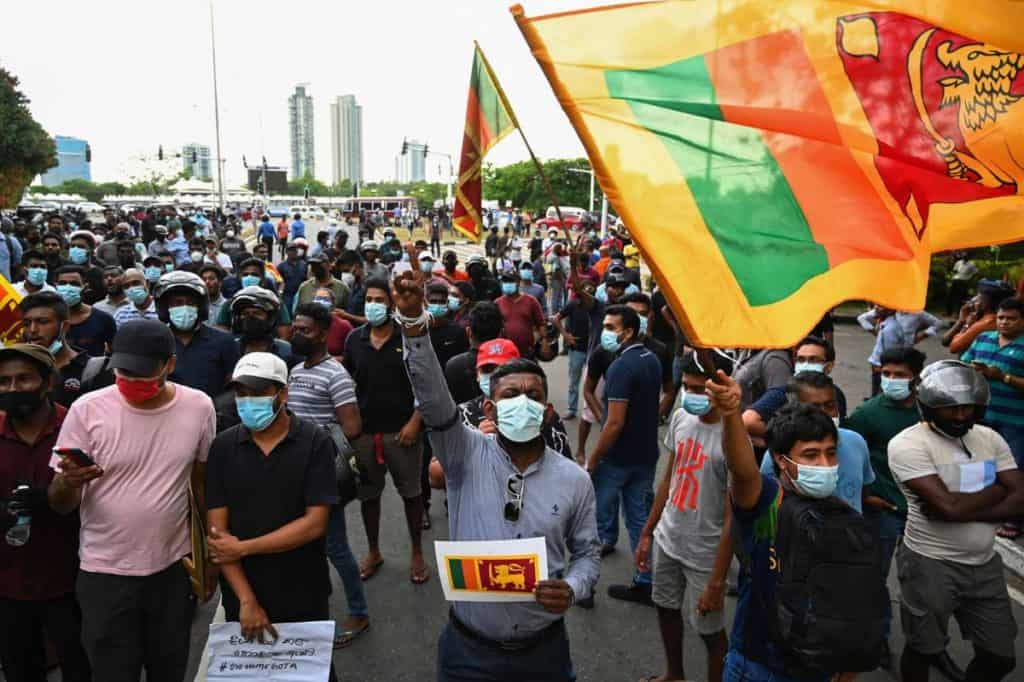By Prof. Engr. Zamir Ahmed Awan
Desperately Sri Lanka is knocking on the doors of IMF. A Sri Lankan delegation heads to Washington, looking to secure up to $4 billion from the International Monetary Fund (IMF) and other lenders to help the island nation pay for food and fuel imports and limit debt defaults.

The team, led by newly appointed Finance Minister Ali Sabry, hopes to start talks with the lender of last resort between April 19 and April 24 and secure aid as early as a week after negotiations.
Whereas the political turmoil at home, with street protests by citizens calling for the ouster of Rajapaksa only, makes the job of convincing the IMF to lend money more difficult. The $81 billion economies faced $8.6 billion worth of debt obligations this year before it suspended payments on foreign loans to preserve cash to pay for essential food and fuel imports.
The last time the IMF extended help to Sri Lanka in 2016, the loan was capped at $1.5 billion and the program was prematurely terminated after disbursing $1.3 billion. That was when the economy was growing at about 5% and tourism accounted for a similar percent of gross domestic product. Now, when the situation is worse, convincing the IMF will be an uphill task.
Sri Lanka is also in talks with the World Bank and the Asian Development Bank for support, Sabry said. Sri Lanka’s top diplomat in Beijing said he’s very confident that China will come through on $2.5 billion in financial support as the island nation’s inflation-driven crisis becomes more dire. Sri Lanka’s High Commissioner to India Milinda Moragoda met Finance Minister Nirmala Sitharaman in New Delhi to seek further help in securing food and fuel imports for the island nation, a statement from the high commission said. New Delhi has already provided a $1 billion credit facility to buy food, medicines, and other essential items as well as $500 million for fuel imports, since the crisis.
Although, ahead of the talks with IMF and other lenders, Sri Lanka has raised interest rates, devalued the local currency, and placed curbs on non-essential imports. A sharp increase in inflation and price hike of basic commodities like food, fuel, and medicine, has prompted unrest in the country to the next level. Its Prime Minister also called on citizens to be patient as prices surge and shortages of food fuel to medicines worsen.
The IMF has said it is “monitoring the political and economic developments very closely,” and is “very concerned” about the hardships suffered by the people, especially the poor and vulnerable.
With a population of approximately 22 million, Sri Lanka is an island country in South Asia. It lies in the Indian Ocean, southwest of the Bay of Bengal, and southeast of the Arabian Sea; it is separated from the Indian subcontinent by the Gulf of Mannar and the Palk Strait. It is strategically located connecting East and West, and has been a significant trade route for centuries.
Being a former British colony, it was a member of commonwealth nations. Since its independence on 4 February 1948, it has been a pro-West nation, keeping close ties with Western World. But, since the rise of China, and the launch of the Chinese mega initiative of Belt and Road (BRI), Sri Lanka joined BRI and attracted Chinese investment. Chinese investment has been contributing to the socio-economic development of the country and a visible impact was witnessed in the form of all major economic indicators. But, the West was not happy with the growing influence of China, as Chinese investments have brought too many Chinese tourists and businessmen to Sri Lanka. Young Sri Lankans were learning the Chinese language and were influenced by Chinese culture. Chinese restaurants and tourist attractions were a very common phenomenon. Some of the shops in the Capital and tourist places were offering menus and price lists in Chinese, and accepting Chinese currency.
Politically, Sri Lanka was realigning with the Eastern world, especially with China and Russia, etc. The abstention from voting on the Ukraine issue in the UN may have angered the US. Although few countries opposed the US-backed resolution on Ukraine, and many abstained, Sri Lanka and Pakistan may have been put on the hit list of the US.
Sri Lank may became the first victim, the very much stable country turned into unrest, and a civil war-like situation was created deliberately. The economy was destroyed and pushed the nation to an almost default stage. The country has been pushed to the verge of collapse, where the Western world, through its instrument of IMF, World Bank, etc., may negotiate to force them to accept their political agenda. It is a modern way of coercion and hybrid war.
Also Pakistan is experiencing an early stage of coercion and hybrid war. But, Pakistan is a nuclear state, and cannot be pressurized so conveniently. 220 million people of Pakistan, despite diversity, are united to safeguard the country. Internal differences, diversity, and groupings, may be overcome, when its sovereignty is challenged.
Author: Prof. Engr. Zamir Ahmed Awan – Sinologist (ex-Diplomat), Editor, Analyst, Non-Resident Fellow of CCG (Center for China and Globalization), National University of Sciences and Technology (NUST), Islamabad, Pakistan.
(The views and opinions expressed in this article are only of the authors and do not necessarily reflect the views, opinion or position of World Geostrategic Insights).
Image Source: Bloomberg







